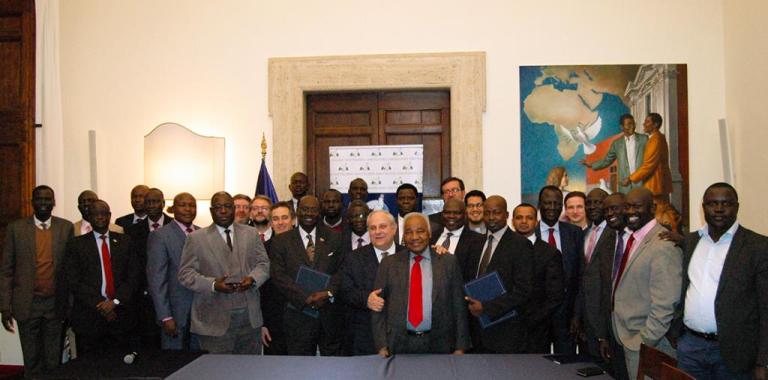News
S. Sudan rebels slam Juba’s decision to halt peace talks

Signatories of Rome declaration pose after the signing ceremony on January 13, 2020, photo St Egidio
by Tesfa-Alem Tekle
South Sudan rebel coalition on Saturday downplayed President Salva Kiir’s government’s decision to withdraw from peace negotiations brokered by Sant’ Egidio, a Catholic association with ties to the Vatican.
In a statement extended to Sudan Tribune, the Non-Signatory South Sudan Opposition Group (NSSOG) said it was dismayed by the government’s move and called on Juba to reverse its decision.
South Sudan’s government announced that it has withdrawn from peace negotiations with rebel groups, accusing them of using the talks “to buy time as they prepare for war,”
In a letter dated November 21 and addressed to Sant’ Egidio, Presidential Affairs Minister Barnaba Marial Benjamin said the government “has suspended its participation in the Rome Peace talks until further notice.”
“While we have been preparing to engage in serious dialogue with Non-Signatory South Sudan Opposition Group to bring lasting peace to our country, it has come to our attention that this group is using these talks to buy time as they prepare for war,” Benjamin said.
The NSSOG together with members of the National Consensus Forum (NCF) were invited by the Community of Sant’ Egidio for consultative meetings slated to take place in Rome on 28th Nov. 2022 to discuss the Round Table Conference.
“The accusations by the Government of South Sudan that NSSOG is preparing to wage a war are baseless and a pretext to pursue its agenda of waging war and scuttling any efforts to bring about lasting peace to the people of South Sudan” reads part of the NSSOG statement.
The NCF initiative calls for an inclusive Roundtable Conference of all South Sudanese to address the Root Causes of the conflict and is to stop all wars and violence.
“Now is the time for all South Sudanese Stakeholders to come together to talk and dialogue on how to rescue and save the country from disintegration and total collapse into chaos and lawlessness,” the rebel group said.
They called upon the South Sudanese government to reverse its decision and return back to the negotiation table.
“NSSOG together with NCF call on the South Sudan Government to reconsider its decision and join the Consultative meetings on the Roundtable Conference”
The Non-Signatory South Sudan Opposition Groups together with all member organizations of the National Consensus Forum (NCF) are committed to the peaceful resolution of the conflict in South Sudan in a Round Table Conference of South Sudanese Stakeholders, the statement further said.
This is the Juba government’s second to pull out of the talks brokered in Rome.
Last year, the government withdrew from Rome talks after accusing one of the groups, the National Salvation Front (NAS), of carrying out indiscriminate attacks in the southern part of the country.
But later in August, it said it was ready to resume discussions.
The rebel coalition in October announced it was changing its name from the South Sudan Opposition Alliance (SSOMA) to the Non-signatories.
Negotiations between the government and a coalition of non-signatory groups began in 2019 but have failed to curb violence in the south of the country, despite a ceasefire signed in January 2020.
The world’s youngest nation has been a scene of chronic instability since it gained independence from Sudan in 2011, including a civil war that killed nearly 400,000 people
A UN senior official on Friday reportedly raised the alarm over the projected increase in the number of people in need of urgent humanitarian assistance in South Sudan.
United Nations Resident Coordinator in South Sudan Sara Beysolow Nyanti said an estimated 9.4 million people, a staggering 76 per cent of South Sudan’s population, will have humanitarian or protection needs in 2023 which presents an increase of half a million people compared to 2022.
“Something has to change in South Sudan because the number of people in need continues to rise every year, and the resources continue to decrease,” Nyanti said in a statement released in the South Sudanese capital of Juba.
She stressed that the deteriorating humanitarian conditions are worsened by endemic violence, conflict, access constraints, operational interference, public health challenges, and climatic shocks such as flooding and localized drought.
(ST)
